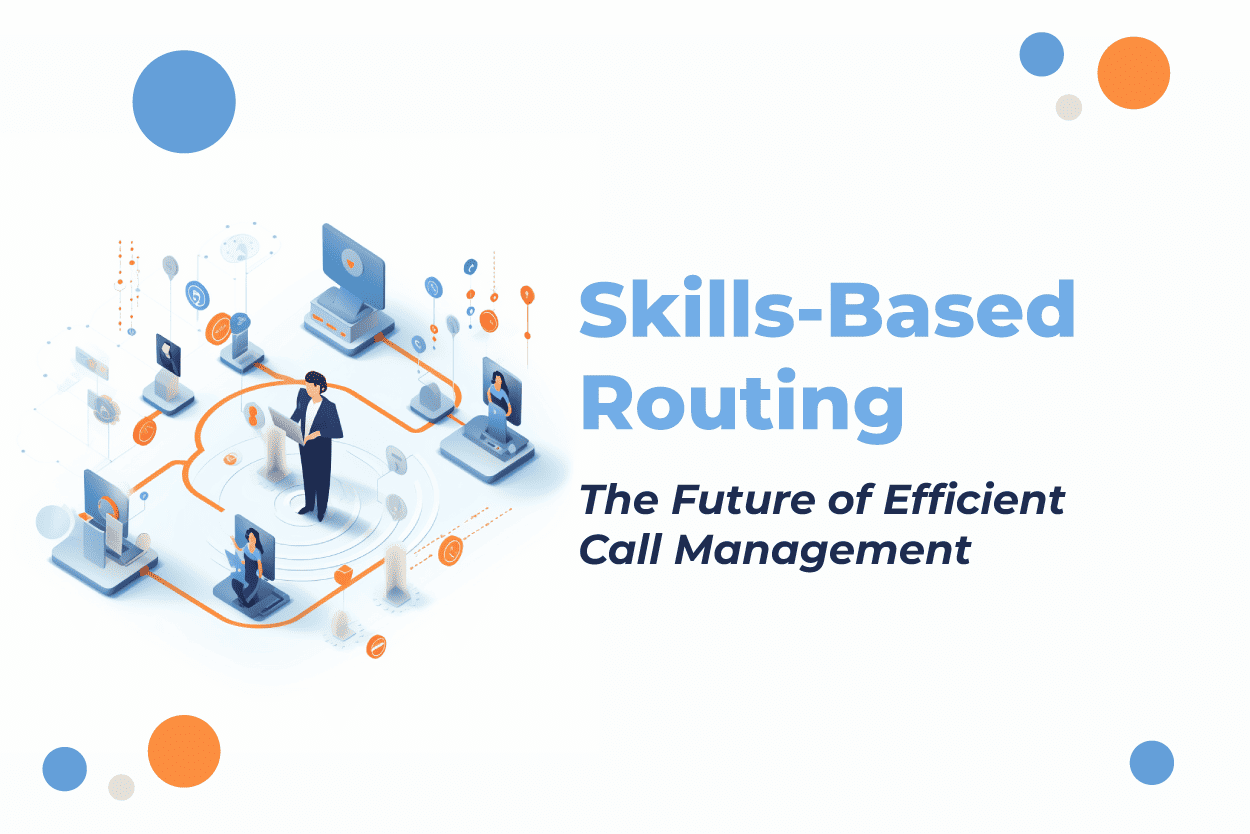In the bustling world of call centers, every second counts, and every call matters. The question is, how do you ensure that the right call lands in the right hands? That’s where skills-based routing comes into play. With it, you can streamline your call center operations and raise the bar of your customer service. Intriguing, isn’t it?
Let’s dive deeper!
What is Skills-Based Routing ?
According to Wikipedia, Skills-based routing (SBR) is a call-assignment strategy used in call centers to assign incoming calls to the most suitable agent, instead of simply choosing the next available agent. It is an enhancement to the automatic call distributor (ACD) systems found in most call centers. The need for skills-based routing has arisen as call centers have become larger and dealt with a wider variety of call types.
“Call center skill-based routing is like having a team of expert matchmakers who seamlessly connect callers to the right agents. It ensures each customer is paired with the most suitable representative, guaranteeing a personalized and efficient interaction every time.” – Christian Montes, Executive Vice President of Client Operations @NobelBiz
Skills-Based Routing refers to an intelligent call distribution technique that matches incoming customer inquiries with the most suitable agent based on specific skills. It goes beyond the traditional first-come, first-serve model by ensuring that each call reaches the right person at the right time.
Picture a traffic controller, except this one doesn’t control cars but routes calls to the most suitable agent available. That’s essentially what skills-based routing is all about. It’s a system where incoming calls are directed to the most skilled agent in that particular area, ensuring a higher chance of first-call resolution. Sounds like a game-changer, right?
How Does Skills-Based Routing Work?
Skills-based routing is like the hardworking stage director behind a successful theatre play. It orchestrates the entire call center operation, making sure the right agents handle the right calls. But what’s the process behind this complex coordination? Let’s break it down.
A well-orchestrated Skills-Based Routing system comprises several integral elements:
- Agent Skill Inventory: A comprehensive and dynamic database that encompasses the diverse skill sets, expertise levels, and proficiencies of all agents. This enables precise matching, ensuring personalized and effective interactions with customers.
- Call Queue Management: An efficient and systematic process designed to prioritize and manage incoming calls effectively. By implementing optimized strategies, it minimizes wait times, ensures prompt attention to customer needs, and maximizes agent availability for seamless call handling.
- Routing Algorithms: An efficient and systematic process designed to prioritize and manage incoming calls effectively. By implementing optimized strategies, it minimizes wait times, ensures prompt attention to customer needs, and maximizes agent availability for seamless call handling.
Understanding Agent Profiles or Skill Inventory
The first step in skills-based routing involves creating detailed agent profiles. Each agent has unique abilities – some may be experts in technical support, some may be multilingual, while others may have in-depth product knowledge. Recognizing and recording these unique skillsets in agent profiles is critical to the routing process. Think of these profiles as a cheat sheet for the routing system to understand who can handle what.
“Agent Profiles provide a comprehensive overview of each agent’s expertise and capabilities, enabling precise matching of customer needs with the most suitable agent for exceptional service delivery.” – Brad Butler, Contact Center Software Consultant @NobelBiz
Defining Routing Rules – Algorithms
Next comes defining the routing rules. These are the guidelines that instruct the system on how to distribute calls based on the customer’s needs and agent’s skills. For instance, a rule might specify that all Spanish-speaking calls should be directed to Agent X, or all technical calls should be directed to Agent Y. It’s like setting the GPS for your call center operations, steering calls in the right direction.
Real-time Call Distribution
Once the agent profiles are set and the routing rules are defined, the real magic begins. As calls come in, the system quickly analyzes each call’s requirements, scans through the available agent profiles, and matches the call to the agent best equipped to handle it. It’s a rapid, dynamic process that happens in real-time, ensuring that customers don’t have to wait long to reach the right agent.
This is just the tip of the iceberg when it comes to understanding how skills-based routing works. As we delve deeper into the intricacies, you’ll discover that there’s more than meets the eye. Up next, we’ll be exploring the many advantages of skills-based routing and why it’s such a game-changer for call centers.
Clinical Trial Media
Advantages of Skills-Based Routing
Skills-Based Routing has a significant impact on both customer satisfaction and operational efficiency. By matching customers with agents possessing the appropriate skills, it guarantees personalized service, faster issue resolution, and increased first-call resolution rates. This strategic allocation of resources optimizes agent productivity, reduces customer wait times, and ultimately fosters stronger customer loyalty and business success. Let’s look at some of the main benefits or routing calls based on skills.
Enhanced Customer Satisfaction
In a world where customer service is increasingly becoming a significant differentiator, skills-based routing plays a pivotal role in enhancing customer satisfaction. Quicker resolution times, fewer call transfers, and dealing with knowledgeable agents who can solve their problems effectively – all these factors contribute to a more enjoyable and less stressful experience for customers. It’s akin to a pleasant shopping experience, where you quickly find the product you want, the staff is knowledgeable and friendly, and you leave the store feeling content and looking forward to your next visit.
Notably, skills-based routing also helps enhance the overall perception of your brand. Customers tend to associate the quality of customer service with the quality of the brand itself. By ensuring a positive customer experience, you’re building a stronger, more positive brand image in the minds of your customers.
Solving the customer service puzzle is one of the most important success indicators for any call center. This is why we encourage you to watch a key podcast episode that can set you on the right track.
Listen to an enlightening episode with Jim Iyoob, where we delve into the evolving landscape of customer expectations, the impact of generational differences on loyalty, and the rise of personalized experiences. Jim emphasizes the importance of measuring key performance indicators, leveraging data for improved business operations and customer satisfaction. Don’t miss this informative and inspiring podcast that explores the frontiers of customer service!
Improved First Call Resolution Rates
The most prominent advantage of skills-based routing is its potential to drastically improve call resolution. By precisely aligning the customer’s needs with the most competent agent, it significantly enhances the chances of resolving the customer’s issues on the first call. Imagine it like a locksmith who, instead of trying every key on a keyring, knows exactly which key fits the lock. The result? A swift, seamless resolution that leaves your customers feeling satisfied and valued.
But it’s not just about speed. It’s also about the quality of resolution. When customers connect with agents who are experts in the specific issue at hand, the advice they receive is not only timely but also more accurate, comprehensive, and personalized.
Reducing Wait Times
Have you ever been stuck in a long line at a grocery store, growing more and more impatient as you watch the clock tick away? That’s how customers feel when they’re put on hold. One of the significant advantages of skills-based routing is its ability to reduce customer wait times.
Call center skill-based routing is the secret weapon to eliminate long wait times. By intelligently matching customers with agents possessing the right skills, it’s like unlocking the fast lane of customer service, delivering prompt assistance and exceptional experiences. – Brad Butler, Contact Center Software Consultant @NobelBiz
By routing each call to the agent best equipped to handle it, the process becomes more efficient, and customers spend less time waiting on hold or being transferred between agents. It’s like having an express checkout lane that’s always open for every customer, no matter how complex their needs. This reduction in wait times leads to happier customers who feel their time is valued, thereby contributing to an overall improved customer experience.
Implementing Skills-Based Routing: A Step-by-Step Guide
Implementing skill-based routing within a contact center requires a few essential components. You’ll need a robust system that captures agent skill sets, an efficient call queue management process, and advanced routing algorithms that analyze customer needs. With these elements in place, you can unlock enhanced customer experiences and operational efficiency.
The transition to a Skills-Based Routing system might seem daunting, but following these steps can simplify the process:
1. Identifying and Cataloging Agent Skills
Begin by cataloging the skills of your customer service team. This inventory forms the backbone of the Skills-Based Routing system and should be updated periodically to reflect changes.
2. Configuring the Routing Algorithm
Configure your call routing software to use a routing algorithm that considers both the skill level of your agents and the complexity of incoming inquiries.
3. Creating an Efficient Call Queue Management System
Implement a call queue system that prioritizes calls based on complexity and customer value. This helps in managing high call volumes without sacrificing customer satisfaction.
4. Monitoring and Refining the System
Finally, consistently review and refine your system. Use metrics like FCR rates and customer satisfaction scores to assess its effectiveness, making adjustments as necessary.
Essential Tools Needed
Of course, you’ll need the right tools: robust omnichannel contact center software with skills-based routing features, a well-managed agent database, and a reliable analytics tool to measure performance.
Join us for an insightful discussion with Kevin Daly, founder of Value Ad and creator of Bestpair. Kevin, leveraging his expertise in sales management and insurance, will delve into data-driven results and the power of data modeling. Learn how to harness data to combat agent attrition and achieve your goals in contact centers.
Check out this podcast episode and learn more about Performance-driven contact centers and data modeling, with Kevin Daly.
Common Challenges in Skills-Based Routing and How to Overcome Them
1. Agent Skill Profiling
One of the first hurdles in implementing skills-based routing is accurately profiling your agents’ skills. Each agent is a unique mix of experiences, knowledge, and talents. Recognizing and recording this diversity can be a complex task.
To overcome this challenge, it’s important to establish a robust profiling system. This could include regular skills assessments to gauge the proficiency levels of your agents in various areas such as language fluency, product knowledge, or technical acumen. Periodic reassessments are crucial as they reflect improvements or changes over time.
In addition, keep your agent database up-to-date. When an agent gains a new skill, ensure it’s recorded. If an agent leaves the team, ensure their profile is deactivated. Think of this database as a dynamic resource that should mirror the real-time status of your agent pool.
2. Routing Rules Management
Managing routing rules can be another complex area. It involves configuring and constantly optimizing the rules that decide which agent is the most appropriate for a given call. These rules need to take into account a variety of factors such as agent availability, customer needs, call priority, and more. It’s like a continuously changing puzzle that needs to be solved in real-time.
The solution to this challenge lies in leveraging the right technology. Advanced call center software can simplify rule management by offering easy-to-use interfaces, intuitive rule creation, and real-time modification capabilities. By selecting the right software, you can transform rule management from a perplexing task into a streamlined process.
3. Continual System Maintenance and Upgrades
Like any system, skills-based routing requires regular maintenance and upgrades to ensure it’s functioning optimally and leveraging the latest advancements in the field. However, this can seem like a daunting task, especially if you don’t have a dedicated IT team.
The key to overcoming this challenge is two-fold. First, ensure your team receives proper training on the system. This includes understanding how it works, how to spot potential issues, and how to initiate fixes. Second, don’t hesitate to seek technical support from your software provider. Their expertise and assistance can prove invaluable in maintaining and upgrading your system, ensuring it continues to offer the best possible service to your customers and your team.
Continual system maintenance is the lifeblood of a thriving contact center. Like a well-tuned engine, it ensures optimal performance, smooth operations, and the ability to adapt to ever-evolving customer needs. Neglecting maintenance can hinder productivity and customer satisfaction, while regular upkeep guarantees sustained success. – Christian Montes, Executive Vice President of Client Operations @NobelBiz
Remember, while these challenges may seem significant, they are not insurmountable. With the right strategies, tools, and mindset, you can overcome these obstacles and reap the benefits of skills-based routing in your call center.
The Road Ahead: Skills-Based Routing and Beyond
While Skills-Based Routing is transforming call management, it’s just the beginning. Advancements in AI and machine learning promise to further revolutionize the field. Companies willing to embrace these technologies will find themselves at the cutting edge of customer service, prepared for the demands of the future.
Embracing Skills-Based Routing isn’t just about upgrading your customer service—it’s a strategic move towards a more efficient, customer-centric business model. With careful implementation and ongoing refinement, it’s a tool that promises to deliver significant benefits, securing your position in the competitive marketplace of tomorrow.
At NobelBiz, Customer First Is So Much More Than Just a Slogan
To succeed as a contact center provider, a company needs to offer flawless, up-to-date, and relevant products and services. However, this is not enough. The competition is so fierce that one always has to offer something more.
At NobelBiz, we wanted to excel at servicing the needs of our contact center clients. With dedicated 24/7 customer support teams, we’ve consistently perfected our procedures and achieved one of the best First Call Resolutions in the industry.
After 20 years in this space, after building and pioneering a unique carrier designed for contact centers; after enhancing it with one of the most reliable cloud contact center software on the market, we’ve now reached a new level of maturity:
Our craft is providing ideal contact center solutions and setting new standards of excellence for how a contact center is being serviced and cared for.

Michael McGuire is a contact center industry expert with almost two decades of experience in the space. His experience includes roles as Director of Contact Center Digital Transformation at NobelBiz, and as Director of Operations at FLS Connect, managing multiple call centers. As President of Anomaly Squared and Targeted Metrics, Michael successfully transitioned companies into remote operations and significantly boosted revenues. With a strong background in customer service, leadership, strategic planning, and operations management, Michael excels in driving growth and innovation in the call center space.
Mike is also a proud Board Member for R.E.A.C.H Trade Group, promoting consumer protection and satisfaction and Co-host of the Off Skripted Podcast – a show about Life, Call Centers and everything in between.








